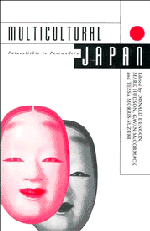Book contents
- Frontmatter
- Contents
- List of Figures and Tables
- List of Contributors
- Abbreviations
- Introduction
- Part 1 Archaeology and Identity
- Part 2 Centre and Periphery
- Part 3 Contact with the Outside
- 8 Some Reflections on Identity Formation in East Asia in the Sixteenth and Seventeenth Centuries
- 9 Siam and Japan in Pre-Modern Times: a note on mutual images
- 10 Indonesia under the ‘Greater East Asia Co-Prosperity Sphere’
- 11 Japanese Army Internment Policies for Enemy Civilians during the Asia-Pacific War
- Part 4 The Japanese Family
- Part 5 Culture and Ideology
- Afterword: Diversity and Identity in the Twenty-First Century
- Index
8 - Some Reflections on Identity Formation in East Asia in the Sixteenth and Seventeenth Centuries
from Part 3 - Contact with the Outside
Published online by Cambridge University Press: 05 November 2011
- Frontmatter
- Contents
- List of Figures and Tables
- List of Contributors
- Abbreviations
- Introduction
- Part 1 Archaeology and Identity
- Part 2 Centre and Periphery
- Part 3 Contact with the Outside
- 8 Some Reflections on Identity Formation in East Asia in the Sixteenth and Seventeenth Centuries
- 9 Siam and Japan in Pre-Modern Times: a note on mutual images
- 10 Indonesia under the ‘Greater East Asia Co-Prosperity Sphere’
- 11 Japanese Army Internment Policies for Enemy Civilians during the Asia-Pacific War
- Part 4 The Japanese Family
- Part 5 Culture and Ideology
- Afterword: Diversity and Identity in the Twenty-First Century
- Index
Summary
A key element of Japan's present identity is embedded in the assumption that in the early modern (more precisely the Azuchi-Momoyama) period, the country was ‘open’ to foreigners and foreign influence; then, save for the Dutch and Chinese in Nagasaki and the Japanese presence in the nominally independent Ryūkyū kingdom and in Korea, the country was ‘closed’ by government diktat enabling Japan to enjoy the benefits of a ‘pax Tokugawa’. The quality of that supposedly blissful era is captured in an anti-Christian tract dating from the end of the 1630s, in words that reflect what was becoming an official Tokugawa ideology: ‘The Empire is at peace, the land in tranquillity, the reign of longevity. The people partake of the virtue of the ruler and his subject princes. Verily, our age can be called another sainted reign of Engi, a golden age indeed’. According to some scholars, the fruits of the ‘pax Tokugawa’ were inestimable, for Japan then achieved a significant level of proto-industrialisation, and by the mid-nineteenth century Japan had achieved the necessary pre-conditions for indigenous industrialisation, whether or not Perry's black ships had turned up in 1853.
The idea of an open/closed rhythm to Japanese history has its appeal. The receptiveness to foreign cultural influence during the Azuchi-Momoyama period resembles Japan's earlier flirtation with Chinese culture during the Heian period. Things Chinese were then very much in vogue before they were rejected – after the Japanese had absorbed whole chunks of Chinese culture.
- Type
- Chapter
- Information
- Multicultural JapanPalaeolithic to Postmodern, pp. 135 - 152Publisher: Cambridge University PressPrint publication year: 1996
- 3
- Cited by

